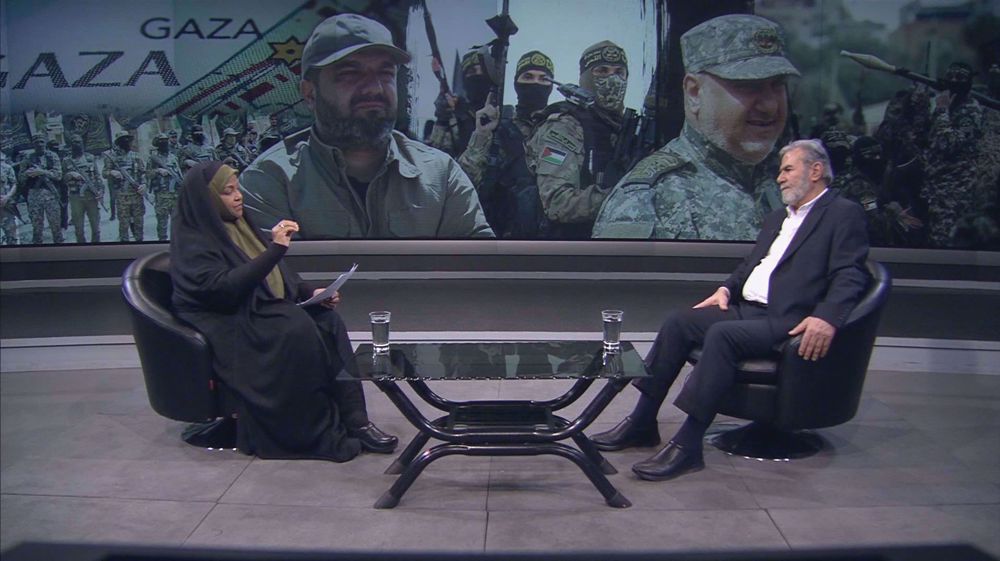Exclusive: Hamas politburo chief says Israel in worst situation ever
The Palestinian resistance movement of Hamas's politburo chief has affirmed that Israel is "living in its worst situation" ever, enumerating the reasons for the unprecedented decline in the Zionist entity's status.
Ismail Haniyeh made the remarks in an exclusive interview with Iran’s English-language Press TV news network on Thursday, following a set of meetings with senior Iranian authorities, including Leader of the Islamic Revolution Ayatollah Seyyed Ali Khamenei.
He referred to the meetings as "fruitful," noting, "There was a chance to talk in detail about all files..., particularly the Palestinian case and developments and our project against the Zionist enemy."
Reasons behind Israel's dire situation
The resistance leader went on to cite three indications of the uniquely dire situation that was being experienced by the occupying entity.
Firstly, he pointed to the "division" that had manifested itself within the Israeli society" that was giving rise to thousands-strong protests against Tel Aviv across the occupied territories every week, noting how some of the Israeli leaders had even come to warn about a "domestic war."
"We didn't use to hear such things from the Israelis."
Secondly, Israel had come to be surrounded by resistance movements, ranging from the Gaza Strip to the holy occupied city of al-Quds to the 1948-present Israeli-occupied territories.
"The third one, there are concerns from the Israeli society about the future. There are polls inside Israel about national security. Sixty percent of the Israelis are concerned about their future. They cannot adapt themselves to the strategic challenges inside Israel."
Five-day war on Gaza
Elsewhere in his remarks, Haniyeh offered a detailed account of how Gaza's resistance factions managed to stage a united and successful response to Israel's five-day-long war on the Gaza Strip in May, which ended in a humiliating defeat for Tel Aviv.
"The common room for operations, which includes all the Palestinian groups, had a meeting...to reply to this crime...There was coordination between Ezzedine al-Qassam Brigades and al-Quds Brigades," he said, referring to the Gaza-based resistance factions' armed wings.
"We in the Hamas movement, offered everything in order to achieve victory against our enemy. We provided all the infrastructures we have in our possession...we put everything at the disposal of our brothers in the Islamic Jihad," he added.
"The resistance managed to defeat the enemy, and affirmed that the blood of the [resistance] leaders would not go to waste, and this enemy will pay all the price for its crimes, particularly when they assassinate the leaders of the resistance either in Jenin or in Gaza or in the West Bank."
Israel dare not cross Gaza, Lebanon borders
The Hamas official recalled how Israel used to occupy Gaza until 2005 and used to be at the heart of Beirut in 1982.
"But today, the Israeli army cannot cross the Lebanese borders. The Israelis withdrew in 2005 after five wars against the Gaza Strip. But now, they cannot take any decision for any ground assault against Palestinians. It would be very costly for them," he stated.
"When in 2014, the Israelis decided to go inside Gaza for maybe 1,000 meters or more than that, 72 soldiers of them were killed," noted the Palestinian official.
"Israel doesn't have the upper hand anymore. Even all their maneuvers are defensive, and not meant to reprise any attack against us," he said, adding, "They are doing their best to see if they can confront any attack from the resistance."
Meeting with Leader
Describing the contents of his meeting with Ayatollah Khamenei, Haniyeh said he concurred with the Leader's description of the Gaza Strip as the "fortress of resistance."
"This description is very precise today. Gaza is the strongest arm of the resistance, despite the fact that it is under a blockade," the Palestinian official stated.
He noted how the resistance's Operation Sword of al-Quds, which came as a response to Israel's latest war on Gaza, struck "the heart of the Zionist occupation entity, and drew a very significant equation with the Israelis as well."
"Therefore, the resistance in Palestine, in Gaza specifically, is the guard of all Palestine."
Iran's support for Palestine
Haniyeh voiced gratitude towards Iran for its "unconditional" support for Palestine, considering the Islamic Republic to be the greatest force behind the Palestinian resistance.
"The Islamic Republic has the biggest share in giving support and increasing the strength of this power [of the resistance]."
Tide changing against Israel in the West
The Hamas official said support had waned for Israel across Western states.
Israel was no longer the "spoiled child" for the United States or for the West, for that matter, he said.
He identified Tel Aviv as "this strong military machine that they (the Western states) needed to serve," but said this was no longer the case anymore.
"The Western societies have actually become tired of the Israeli crimes and practices."
Iran, Saudi Arabia detente
Israel, Haniyeh said, used to thrive on instability across the region, but instances of region-wide reconciliation, such as the ongoing detente between Iran and Saudi Arabia and Syria's return to the Arab fold, heralded more regional stability that augured ill for Tel Aviv.
"In the last decade, the regional situation was very much fragile because of everything that has happened, whether within the countries or between two countries, whether it was the sectarian issues that happened, for example, Daesh that entered the region in a way that it had shifted the cards in the region..."
"This issue was a golden age for the Zionist entity, and, therefore, they were able to isolate the Palestinian cause."
However, reconciliations such as the one between Iran and Saudi Arabia or the changing of the regional tide in favor of Syria, function as portents of regional stability that serve the resistance's interests, but harm those of Israel.
"When the region is stable, when it is in a state of agreement, therefore, this would be in favor of the interest of Palestine and for the resistance of Palestine."
Iran and Saudi Arabia's rapprochement also flew directly in the face of the Israeli strategy of painting the Islamic Republic in a bad light.
"The second advantage is that it hits the strategy of the Israelis, through which they wanted to say that Iran is the enemy and Israel is the ally. This has failed. [The rapprochement has shown] that Iran is a brotherly nation in the region."
Gen. Soleimani's focal personality in invigorating resistance
Commenting on Iran's former senior anti-terror commander, Lieutenant General Qassem Soleimani, who was assassinated in a US drone attack against Baghdad in early 2020, Haniyeh called him "a focal personality in the support of the resistance in Palestine," and praised his pivotal role "in building the resistance in Palestine."
"His assassination showed that the Americans had had enough of the [sheer] strength of Haj Qassem."
Palestinians can defeat whatever Israel throws at them
Concluding his remarks, Haniyeh pointed to comments that have been made by such extremist figures as Israel's so-called national security minister Itamar Ben-Gvir, who have been promoting unprecedented aggression against Palestinians.
"Do not bend the arm of the resistance. The Palestinian people can overcome everything that you are planning. Ben-Gvir would go to the trash bins of history. The Palestinian people have always defeated such personalities...They will not be able to do anything against the Palestinian people."
US F-15E Strike Eagle multi-role attack fighter jet downed by IRGC air defenses
Iran won't target its neighbors, but US bases across region: FM spox
‘Unacceptable cowardice’: Indians slam Modi govt’s silence over US attack on Iranian ship
Trump's ‘peace through strength' stained with blood of innocent kids: Larijani
Qatar's LNG shutdown severely hits global economy: Ex-CEO of Iran's fuel company
Iran deputy FM says no messages exchanged with US since war
105 civilian facilities hit, 21 hospitals damaged in US-Israeli aggression: IRCS
Iran school massacre shows global failure to enforce war crime accountability: Analyst













 This makes it easy to access the Press TV website
This makes it easy to access the Press TV website